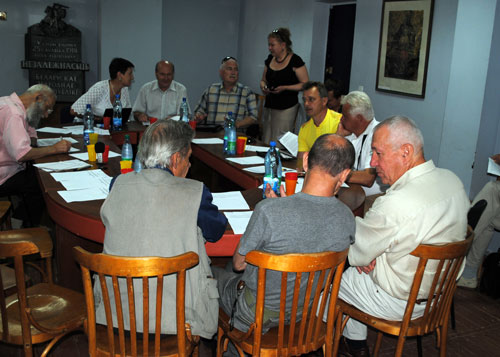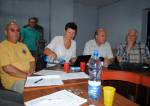Lustration in Belarus: to be or not to be?
The Minsk-based central office of the Belarusian Popular Front hosted yesterday a round table discussion attended by representatives of civil society movements, party leaders and human rights activists to debate on the concept of lustration in the transition from an authoritarian regime to a democracy. The term "lustration" or cleansing of the society is almost unknown for the majority of Belarusians. It caused a lot of questions among more experienced professionals who took part in the discussion.
According to an active member of the working group on the development of the concept, Mrs. Valiantsina Sviatskaya, independent experts and representatives of various democratic institutions did not aim at creating the final document, but first of all sought to present a draft concept for discussion that will form the basis for a serious and painstaking work of lawyers and legislators.
“Numerous debates and experience of the neighboring countries resulted in the creation of the text entitled “Lustration in Belarus.” This is not a project for a future bill, it is, so far, “materials to the concept of lustration.” But it seems to us that it is high time to start a serious discussion on the topic. Otherwise, we may be late,” says Mrs. Sviatskaya.
One of the members of the ad hoc working group on the development of this concept, historian Ihar Kuzniatsou expressed his vision of lustration in Belarus, described the experience of foreign countries and shared his thoughts on the further discussion of the concept of lustration in Belarusian society.
Through condemnation of totalitarianism and authoritarianism society can prevent restoration of former regimes and go directly to the lustration as a political practice, which is based on the legislative restriction of individuals on professional, party membership, religious or other grounds.
Among various criteria for such restrictions, Ihar Kuzniatsou enumerates three main points: restriction on the occupation of certain specific government positions; professional practice, or a ban on the profession; privacy (as lustration allows for public dissemination of information, such as cooperation with the secret police).
“It is important that specific people should be found responsible, those who have knowingly committed unlawful acts, not some parties, organizations or other entities,” says the expert.
Lawyer Hary Pahaniayla, who actively debated during the meeting, admits that lustration is a very complex process, "We must make it clear what is a crime in the area, realize that, for example, the seizure of state power by unconstitutional means in Belarus, which took place in November 1996, is a point of reference and the principal offense, which later turned into the usurpation of power. And thus, for those who commit it and actively helped, there will be no statute of limitations, because it is also related to extrajudicial executions, which is a crime against humanity. Hence, it also has no time limits for criminal responsibility. Another issue is that of government posts. This should be carefully spelled out in the concept: who has no right to occupy them. Another opportunity to "settle accounts" with offenders is a civil lawsuit, once you think you're offended and you have the opportunity to blow the whistle.
The punishment of criminals related to today’s undemocratic regime, according to the head of the Belarusian Helsinki Committee Aleh Hulak, must first of all take place in the legal framework, “Often we see that the problem of lustration is perceived by many as settling of personal scores, the possibility of revenge: they pressured us, then we will pressure them! I cannot agree because any government that wants to be called democratic and become one needs to act within the framework of the rules and standards that exist in a democratic society. We need to clearly spell out what is good and what is bad, so that this "bad" never came back.”
Anatol Liabedzka, chairman of the United Civil Party, also shared his opinion. He primarily sees lustration as part of the modernization plan of the entire Belarus, while deputy chairman of the Belarusian Party of the Left "Fair World" Valery Ukhnalou proposed to separate the process of lustration and condemnation of the regime. By the way, the BPF already has its own mechanism of lustration.
The coordinator of the public initiative "For the Preservation of the Kurapaty Memorial” and former Gulag prisoner Uladzimir Ramanouski called lustration an attempt to restore civil liability, and his colleague Marat Haravy first of all sees lustration as public repentance.
Among the main goals of lustration, political analyst Yury Chavusau notes a guarantee of the rights and freedoms of citizens, especially those affected by the crimes. Restoration of their rights is the punishment of those who were involved in the crimes. And the purpose of preventing the return of authoritarian rule is not a legitimate aim for restricting human rights. Lustration, in his opinion, should be done only to a certain extent, so that the goal, i.e. the restoration of the rights and freedoms of others and the preservation of national security, could be achieved. The rest is a "witch hunt."




















